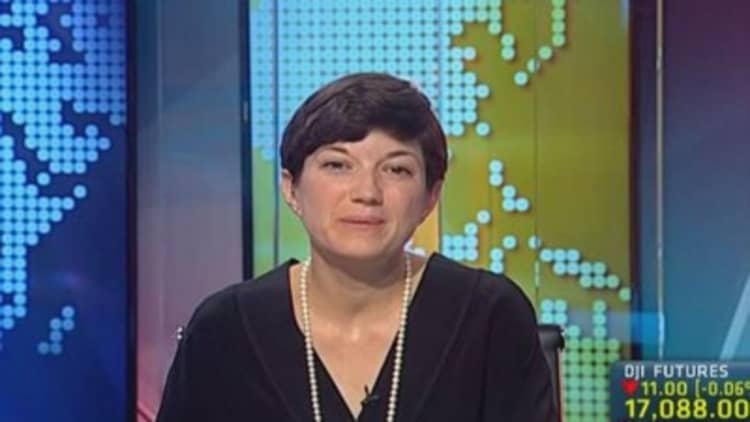Baby boomers and their elderly parents are flocking to advisory practices that incorporate both financial planning and elder-care expertise—when they can find them.
A handful of financial advisors across the country have made elder-care planning a primary focus of their practices. The demand has been formidable.
In 2008, Lauren Locker, certified financial planner and owner of Locker Financial Services, established the ElderLife division of her practice to offer services related not only to traditional retirement planning but also giving and receiving care, elder-housing options and advance planning for incapacitation and end of life. She is also registered as a financial gerontologist by the American Institute of Financial Gerontology.
"The impact was huge—it totally changed the practice," Locker said, adding that "the more people understood the services, the more referrals came."
Read MoreAdvisors hooked on niche clientele
She added, "It has become a steady stream. And the [new] people who came in then wanted us do their investment management."
The majority of Locker's existing clientele, ages 40 to 65, has also gone through this enhanced planning process. She took a pioneering leap with her new division.
"Over the years, we noticed more and more people coming in with these types of issues, and we realized [that] it's time; there's no one helping us; let's do this," she said.
Taking the focus on elder care one step further, Barbara Steinberg's firm, BLS Eldercare Financial Solutions, concentrates only on this area.
Read MoreThe billions behind broke athletes
Since 2006, Steinberg has been providing assistance to families to facilitate paying for elder care. Her flat-fee services include financial analysis, setting up trusts, Medicaid planning and applications and accessing veteran benefits.
Her target clientele is adult children with parents in need of long-term elder care. The average parent client is 95 years old, with $200,000 to $300,000 in assets.

"In about five years, I had more work than I could handle," Steinberg said. "I give clients peace of mind. They're in a panic about how they're going to pay for care," she added. "I serve as someone to lean on who is not an attorney."
Read MoreFocus on niche adds value, fuels returns
Steinberg is a registered financial gerontologist and an accredited agent of the Department of Veterans Affairs. ("Accreditation means the authority granted by VA to assist claimants in the preparation, presentation and prosecution of claims for benefits," according to the VA website.) She believes that specialized training is a must. "The typical financial advisor does not have the [inside] knowledge of the industry," she said. "I always networked within the senior health-care community.
Serving the 80-plus set
"They accepted me as one of their own, because I'm not selling financial products," she added. "We don't do investment management, so we refer that out to other financial advisors."
Ralph Robbins is similarly specialized, focusing his practice on what he calls "crisis Medicaid eligibility planning" and obtaining veteran aid and attendance benefits in Florida. He characterizes his typical client as an 84-year-old widow of a veteran, who lives modestly.
Read MoreAdvisors zero in on Gens X, Y
Robbins, a certified financial planner, had a traditional generalist practice from 1987 until 2004, during which time he developed a keen interest in elder-care planning.
"Most of my clients were single women over 50, and more and more of their parents needed elder care," he said. "The issues kept coming up around how to fund it and how to access Medicaid."
There are very few CFPs doing this, but it may be something they should look into. With our financial background, we're able to look at a lot of moving pieces: highly appreciated assets, tax issues, annuities [and] life insurance policies.Ralph Robbins, certified financial planner
He fell in love with—and developed his expertise in—this field, becoming, like Steinberg, an accredited agent of the VA, one of only eight independent non-attorney agents in south Florida.
By 2004, Robbins had "wiped the slate clean," having transitioned away from managing assets completely to doing full-time, flat-fee elder-care financial planning. He helps individuals combine their personal resources with public benefits to fund care at home, in assisted-living facilities or in nursing homes.
Read MoreMore advisors catering to women
"There are very few CFPs doing this, but it may be something they should look into," he said. "With our financial background, we're able to look at a lot of moving pieces: highly appreciated assets, tax issues, annuities [and] life insurance policies."
An even rarer breed is Chris Cooper, certified financial planner and owner and founder of Chris Cooper and Co. While he provides traditional financial planning, he also offers a suite of elder-focused services, such as geriatric-care management and professional fiduciary services. His target client is a 50-year-old caring for an 80-year-old.
Suite of elder services
Under the geriatric-care management umbrella, Cooper has the expertise to provide comprehensive assessment and planning—for both disabled adult and family—within the following domains: medical, psychological, social, environmental, legal and financial.
As a licensed professional fiduciary, he can be contracted to manage the affairs of individuals who cannot do so on their own, in areas ranging from day-to-day financial issues to investment and estate management.
What is a professional fiduciary?
"Professional fiduciaries provide critical services to seniors, disabled persons and children. They manage matters for clients, including daily care, housing and medical needs, and also offer financial-management services, ranging from basic bill-paying to estate and investment management."—California Department of Consumer Affairs
"A fiduciary is a person who assumes responsibility for a position of trust. [They] serve by court appointment as guardians, conservators and personal representatives of estates. They also serve by agreement as trustees, representative payees or as agents under powers of attorney."—Professional Fiduciary Association of California
—D.N.
He serves as a client advocate, overseeing and outsourcing needed client functions to attorneys, trust companies, investment managers, social workers, geriatric-care managers, hospice, government agencies and the like.
"There are people doing parts of these, such as Medicaid planning or bill-paying, but not the whole kitchen sink," Cooper said.





